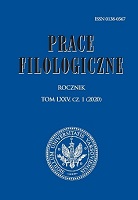The Skewed Frequency Hypothesis and the identification of valent nouns in English
The Skewed Frequency Hypothesis and the identification of valent nouns in English
Author(s): Jakub SlámaSubject(s): Language studies, Theoretical Linguistics, Philology
Published by: Wydział Polonistyki Uniwersytetu Warszawskiego
Keywords: argument structure; Construction Grammar; colligation; complements; noun valency;
Summary/Abstract: I propose the Skewed Frequency Hypothesis, according to which the distribution of corpus types following immediately after the occurrences of a valent noun is significantly skewed, unlike with avalent nouns. The question explored in this paper is whether this observation can be used to retrieve a list of valent nouns from a corpus. Two simple ratios are used to measure the skewness of the distribution of types, and it is shown that the two ratios are correlated and serve as somewhat reliable cues of noun valency. The cases are discussed in which the two ratios suggest conflicting results, and it is argued that these cases serve as one of the arguments for viewing noun valencyin English as a scalar phenomenon rather than a binary possibility (valent vs. avalent). Finally, I also discuss some other issues concerning noun valency in English, and based on the data, I suggest treating noun valency in terms of Construction Grammar.
Journal: Prace Filologiczne
- Issue Year: 75/2020
- Issue No: 1
- Page Range: 437-452
- Page Count: 16
- Language: English

